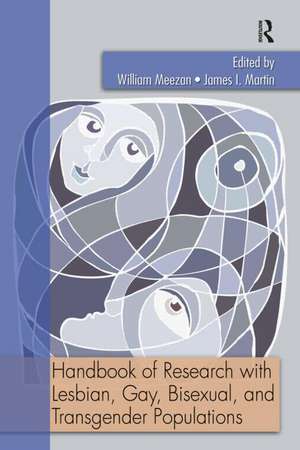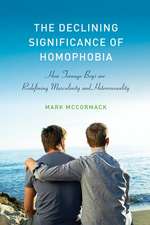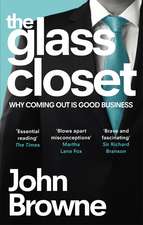Handbook of Research with Lesbian, Gay, Bisexual, and Transgender Populations
Autor William Meezan, James I. Martinen Limba Engleză Paperback – 19 dec 2008
Collecting essays by notable researchers and scholars in the field, Handbook of Research with Lesbian, Gay, Bisexual, and Transgender Populations provides meaningful analyses of the ethics and practical constraints that researchers confront in dealing with LGBT populations--including protection of privacy--which is a special concern for many. For students, teachers, social workers, mental health professionals, and researchers of all backgrounds, this is an invaluable resource and guidebook for anyone seeking a better quality of understanding and engagement with LGBT individuals and communities.
| Toate formatele și edițiile | Preț | Express |
|---|---|---|
| Paperback (1) | 715.27 lei 6-8 săpt. | |
| Taylor & Francis – 19 dec 2008 | 715.27 lei 6-8 săpt. | |
| Hardback (1) | 1129.25 lei 6-8 săpt. | |
| Taylor & Francis – 19 dec 2008 | 1129.25 lei 6-8 săpt. |
Preț: 715.27 lei
Preț vechi: 872.28 lei
-18% Nou
Puncte Express: 1073
Preț estimativ în valută:
136.89€ • 142.38$ • 113.01£
136.89€ • 142.38$ • 113.01£
Carte tipărită la comandă
Livrare economică 14-28 aprilie
Preluare comenzi: 021 569.72.76
Specificații
ISBN-13: 9781560235316
ISBN-10: 1560235314
Pagini: 472
Ilustrații: 2 Line drawings, black and white; 5 Tables, black and white
Dimensiuni: 152 x 229 x 27 mm
Greutate: 0.87 kg
Ediția:1
Editura: Taylor & Francis
Colecția Routledge
Locul publicării:Oxford, United Kingdom
ISBN-10: 1560235314
Pagini: 472
Ilustrații: 2 Line drawings, black and white; 5 Tables, black and white
Dimensiuni: 152 x 229 x 27 mm
Greutate: 0.87 kg
Ediția:1
Editura: Taylor & Francis
Colecția Routledge
Locul publicării:Oxford, United Kingdom
Cuprins
Preface. William Meezan & James I. Martin. WHY DO LGBT RESEARCH? 1. What’s ‘Queer’ Got to do With It? Enlightening Mainstream Research. Perry Silverschanz. DOING IT RIGHT: ETHICAL STANDARDS IN CONDUCTING RESEARCH. 2. Applying Ethical Standards to Research and Evaluations Involving Lesbian, Gay, Bisexual, and Transgender Populations. James I. Martin & William Meezan. 3. Strategies for Recruiting and Protecting Gay, Lesbian, Bisexual, and Transgender Youths in the Research Process. Diane E. Elze. DOING VALID RESEARCH. DEFINING THE POPULATION AND SAMPLING. 4. Defining Sexual Identity and Sexual Orientation in Research with Lesbians, Gay Men, and Bisexuals. Cheryl A. Parks, Tonda L. Hughes, & Lisa Werkmeister-Rozas. 5. No More Lip Service: How to Really Include Bisexuals in Research on Sexuality. Paula C. Rodriguez Rust. 6. Sampling Approaches to Studying Mental Health Concerns in the Lesbian, Gay, and Bisexual Community. Heather L. Corliss, Susan D. Cochran, & Vickie M. Mays. THINKING IN COMPLEX WAYS: APPROACHES TO CONCEPTUALIZATION, DESIGN, AND MEASUREMENT. 7. Self-Disclosure Stress: Trauma as an Example of an Intervening Variable in Research with Lesbian Women. Marion Swindell & Jo Pryce. 8. Dimensions of Lesbian Identity during Adolescence and Young Adulthood. Stephanie Swann & Jeane W. Anastas. 9. Timed Lives: Cohort and Period Effects in Research on Sexual Orientation and Gender Identity. James I. Martin & Anthony R. D’Augelli. MAXIMIZING THE VALIDITY OF THE DATA: "INSIDERS" AND "OUTSIDERS". 10. When Interviewing "Family": Maximizing the Insider Advantage in the Qualitative Study of Lesbians and Gay Men. Michael C. LaSala. 11. Researching Gay and Lesbian Domestic Violence: The Journey of a Non-LGBT Researcher. Joan C. McClennen. USING TECHNOLOGY TO ENHANCE THE RESEARCH ENTERPRISE. 12. "You’ve Got Subjects": The Promise of the Internet in Research with Lesbian, Gay, Bisexual, and Transgender Populations. Kristina Hash & Sharon Melinda Spencer. CHALLENGES IN DOING RESEARCH ON POPULATIONS AT THE MARGINS. 13. The Questions We Ask: Conducting Socially-Conscious Research with Transgender Individuals. Katherine Rachlin. 14. Issues in Conducting Empirical Research with Lesbian and Gay People in Rural Settings. Melanie D. Otis. 15. Methodological Issues in Conducting Community-Based Health and Social Services Research among Urban Black and African-American LGBT Populations. Darrell P. Wheeler. 16.Research with Gay Drug Users and the Interface with HIV: Current Methodological Issues for Social Work Research. E. Michael Gorman. ADDRESSING THE SOCIAL AND POLITICAL CONTEXT. 17. A Method for the Margins: A Trans Feminist Oral History. Darryl B. Hill. 18. Matching AIDS Service Organizations’ Philosophy of Service Provision with a Compatible Style of Program Evaluation. Sarah-Jane Dodd & William Meezan. 19. Social Work Research and the Law: How LGBT Research Can Be Structured and Used to Affect Judicial Decisions. Allan Edward Barsky. 20. Considerations in Choosing an LGBTTQ-Focused Scholarship Agenda in Social Work. Elizabeth P. Cramer. CONCLUSIONS 21.Doing Research on LGBT Populations: Moving the Field Forward. William Meezan & James I. Martin
Notă biografică
William Meezan, M.S.W., D.S.W. is Dean of the College of Social Work at The Ohio State University. Prior to his assuming his current role, he held endowed professorships at the University of Michigan and the University of Southern California. He began his faculty career at the University of Illinois at Chicago’s Jane Addams College of Social Work, and in 1994-95 he was a senior Fulbright scholar in Lithuania. His manuscripts have appeared in Social Service Review, Children and Youth Services Review, Child Welfare, and many others, as well as in a number of anthologies. He has co-authored four books that report the results of his largest research studies: Family Preservation and Family Functioning (CWLA Press); Evaluating Family-Based Services (Aldine); Care and Commitment: Foster Parent Adoption Decisions (SUNY Press); and Adoptions without Agencies: A Study of Independent Adoptions (Child Welfare League of America). In addition, he has co-edited five other volumes, including Research Methods with Gay, Lesbian, Bisexual and Transgender Populations (Haworth), Child Welfare: Current Dilemmas-Future Directions (F.E. Peacock) and two volumes of the journal Reflections: Narratives of Professional Helping concerned with issues involved in "Doing Research on the Ground." In 2005 he was inducted into the Columbia University School of Social Work Hall of Fame.
James I. Martin, M.S.W., Ph.D. is Associate Professor and Director of the Ph.D. Program at the New York University School of Social Work. Prior to his academic career Dr. Martin practiced clinical social work in mental health settings for 13 years and provided clinical supervision, with particular expertise in practice with gay and lesbian individuals and couples. He is co-author of Lesbian, Gay, and Bisexual Youths and Adults: Knowledge for Human Services Practice (Sage) and author of the monograph Jenseits der Homosexualität?: Zur Zukunft der HIV-Prävention für schwule Männer (Social Science Research Center, Berlin). He has co-edited Lesbian, Gay, Bisexual, and Transgender Issues in Social Work: An Annotated Bibliography (CSWE Press) and Research Methods with Gay, Lesbian, Bisexual, and Transgender Populations (Haworth). His writing has appeared in Social Work Research, Health & Social Work, Child & Adolescent Social Work Journal, Journal of Gay & Lesbian Social Services, Clinical Social Work Journal, Psychological Reports, and Sexualities, in addition to several anthologies on clinical practice and research methods.
James I. Martin, M.S.W., Ph.D. is Associate Professor and Director of the Ph.D. Program at the New York University School of Social Work. Prior to his academic career Dr. Martin practiced clinical social work in mental health settings for 13 years and provided clinical supervision, with particular expertise in practice with gay and lesbian individuals and couples. He is co-author of Lesbian, Gay, and Bisexual Youths and Adults: Knowledge for Human Services Practice (Sage) and author of the monograph Jenseits der Homosexualität?: Zur Zukunft der HIV-Prävention für schwule Männer (Social Science Research Center, Berlin). He has co-edited Lesbian, Gay, Bisexual, and Transgender Issues in Social Work: An Annotated Bibliography (CSWE Press) and Research Methods with Gay, Lesbian, Bisexual, and Transgender Populations (Haworth). His writing has appeared in Social Work Research, Health & Social Work, Child & Adolescent Social Work Journal, Journal of Gay & Lesbian Social Services, Clinical Social Work Journal, Psychological Reports, and Sexualities, in addition to several anthologies on clinical practice and research methods.
Descriere
Handbook of Research with Lesbian, Gay, Bisexual, and Transgender Populations provides a detailed examination of the current methods and theoretical frameworks for conducting research with LGBT populations and advocates for the practical advantages of introducing greater complexity and nuance in designing and implementing research models.










